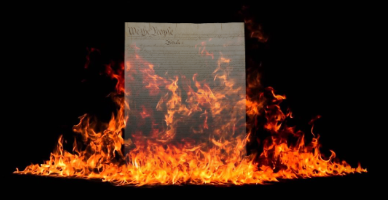
Well, ok. It wasn’t too big to occasionally be useful, or too big to kinda function. At least for a while.
But the U.S. was too big to stay unified.
350 million people, with the level of communication technology we have now, will always find lots of things to disagree over.
And some of those disagreements will be heated.
And some will get violent.
And, boom; here we are today.
With a minority government elected by a historically small margin tearing the place down.
And really, this is all because the locus of law and political activity has settled firmly at the federal level, as it was designed to do.
The country has divided into three roughly equally-sized camps:
- “conservative”: a coalition of authoritarians who insist that everyone must live the way they think people lived 50, 100, 250 or more years ago, corporate oligarchs and their followers and increasingly outright fascists
- “progressive”: a coalition of authoritarians who insist everyone must live the way their own personal idea of Utopia dictates, labor activists pining for the days when the New Deal was young and (not) surprisingly few actual communists
- “independent”: everyone else, from authoritarians who want something extremely niche to people who just want all the authoritarians to go away and leave them alone
The national elections swing between progressive and conservative because, while both camps are roughly the same size, neither is big enough to actually win without an ever-changing slice of the independents. And the independents largely hate at least one and often both of them.
So, that’s not really a stable position for a country to be in.
The simplest solution to that, though not an easy one to actually implement, is to stop trying to make everyone live under identical laws and in identical social arrangements, and let the population shift around so people can find local areas that align more closely with their personal values.
The Constitution, as written, prevents that.
I’ve discussed this before: the Constitution as written sets out a hierarchy of law:
federal constitution -> federal law -> state constitutions -> state law
This is what eventually forces all political activity to the federal level: there’s no point changing local laws, if your opponents can just (haha) trump that by changing state or federal laws. Federal laws even override the state constitutions in this system.
A more flexible and localized system would set out a hierarchy more like this:
federal constitution -> state constitutions -> federal law -> state law
Or better still, given that many counties are larger than some states:
federal constitution -> state constitutions -> county constitution -> federal law -> state law -> county law
(Seriously, the county I live in has the population of Wyoming and the land area of Rhode Island, and we’re far from the largest county in either metric.)
Now that‘s states’ rights; it’s also diversity, which the other side claims to value, so they both get something that they want out of this.
Of course, there’d also be things they hate but at least they wouldn’t have to live with them.
But that’s the nature of a large country: it has a lot of people in it and they won’t agree about lots and lots of things.
But if you want a country that isn’t full of violent factions constantly trying to suppress each other that’s the trade-off you have to make: stop trying to control everyone, and build a system where everyone isn’t trying to control you.
- Archive: An Open Letter to Be’s Jean-Louis - 2025-08-29
- Breaking News: Grand Jury Actually Does Its Job - 2025-08-28
- Literally The Least They Can Do: Some Hard Words About “Soft Secession” - 2025-08-27
- The Old Dog Needs Some New Tricks: Learning From The Laboratories Of Democracy
- High Crimes And Misdemeanors: Everything He Does Is Illegal, So Is He Really President?
- Dueling Sovereigns: The Feds Are Arresting State Judges
- Unitary Executive: Proving The Anti-Federalists Were Right
- You Should Read This: Will Trump Force America to Break Up?
